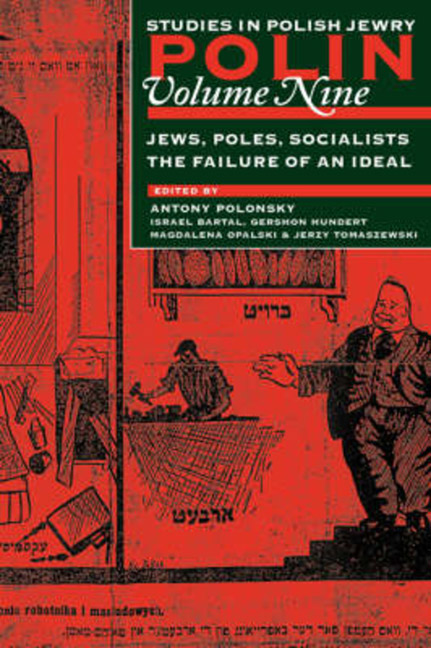Book contents
- Frontmatter
- Dedication
- Editors and Advisers
- Preface
- Acknowledgement
- Polin
- Polin: Studies in Polish Jewry
- Contents
- Note on Transliteration, Names, and Place Names
- Abbreviations
- Introduction
- PART I POLES, JEWS, SOCIALISTS: THE FAILURE OF AN IDEAL
- Jewish Socialists in the Kingdom of Poland
- The Jewish Problem in Polish Socialist Thought
- The Relation of the Polish Socialist Party: Proletariat to the Bund and the Jewish Question, 1900-1906
- The Jews, the Left, and the State Duma Elections in Warsaw in 1912: Selected Sources
- Jews and the Russian Revolution: A Note
- The Bund in Poland, 1935-1939
- Łodź Remained Red: Elections to the City Council of 27 September 1936
- The Jews of Vilna under Soviet Rule, 19 September-28 October 1939
- The Polish Underground and the Extermination of the Jews
- The Jewish Underground and the Polish Underground
- The Pogrom in Kieke on 4July 1946
- Antisemitism in Poland in 1956
- PART II NEW VIEWS
- PART III REVIEWS
- REVIEW ESSAYS
- BOOK REVIEWS
- Bibliography Of Polish-Jewish Studies, 1993
- Notes on Contributors
- Notes on Translators
- Glossary
- Index
The Bund in Poland, 1935-1939
from PART I - POLES, JEWS, SOCIALISTS: THE FAILURE OF AN IDEAL
- Frontmatter
- Dedication
- Editors and Advisers
- Preface
- Acknowledgement
- Polin
- Polin: Studies in Polish Jewry
- Contents
- Note on Transliteration, Names, and Place Names
- Abbreviations
- Introduction
- PART I POLES, JEWS, SOCIALISTS: THE FAILURE OF AN IDEAL
- Jewish Socialists in the Kingdom of Poland
- The Jewish Problem in Polish Socialist Thought
- The Relation of the Polish Socialist Party: Proletariat to the Bund and the Jewish Question, 1900-1906
- The Jews, the Left, and the State Duma Elections in Warsaw in 1912: Selected Sources
- Jews and the Russian Revolution: A Note
- The Bund in Poland, 1935-1939
- Łodź Remained Red: Elections to the City Council of 27 September 1936
- The Jews of Vilna under Soviet Rule, 19 September-28 October 1939
- The Polish Underground and the Extermination of the Jews
- The Jewish Underground and the Polish Underground
- The Pogrom in Kieke on 4July 1946
- Antisemitism in Poland in 1956
- PART II NEW VIEWS
- PART III REVIEWS
- REVIEW ESSAYS
- BOOK REVIEWS
- Bibliography Of Polish-Jewish Studies, 1993
- Notes on Contributors
- Notes on Translators
- Glossary
- Index
Summary
IDEOLOGICAL DECISIONS AND POLITICAL STRUGGLES
THE months of April and May 1935 were turning-points in the history of the Jewish community in Poland between the two world wars. At that time two events occurred that marked the beginning of the change. In April 1935 Poland received a new constitution, one that legitimized the existing autocratic regime by transferring broad powers of government from the Sejm to the president. The new constitution made the rights of citizenship for all citizens conditional on fufilment of their obligations to the state. In May 1935 Józef Pilsudski, who had led Poland through a critical period, died. His demise cleared the way for the rise of Fascist and explicitly antisemitic elements. The new constitution and Pilsudski's death were unfavourable portents for the civil and legal status of Polish Jewry, their sources of livelihood, and their relationships within Polish society. These events also influenced political forces within the Jewish community.
Even before the Nazis came to Poland there were segments of Polish society that regarded the Jews, who were a large, vibrant community, as an unwanted population that was not and could not be an organic part of the Polish nation. Extremist and moderate political elements from the government camp as well as the opposition Socialists and Endeks believed that mass emigration of the Jews from Poland was the most desirable solution to the Jewish question. In a country beset with severe economic and governmental problems, as well as political and social tensions, the Jewish problem became a focus for public discussion, whose effects were felt even outside Poland. In these insecure times Jews struggled for their daily bread in an economy large segments of which had been closed to them even before the second half of the 1930s. They defended themselves against violent attacks in the streets and searched for countries that would open their gates to the large numbers of Jews who wanted to emigrate. The Jewish political parties and movements took part in the struggle for existence and proposed various courses of action.
By the second half of 1933 the Jewish Workers’ Party, the Bund (Algemayner Yidisher Arbeter Bund in Poyln), came to the end of a process of crystallization, reorganization, and ideological change that had begun in the early 1930s.
- Type
- Chapter
- Information
- Jews, Poles, Socialists: The Failure of an Ideal , pp. 58 - 82Publisher: Liverpool University PressPrint publication year: 2008

